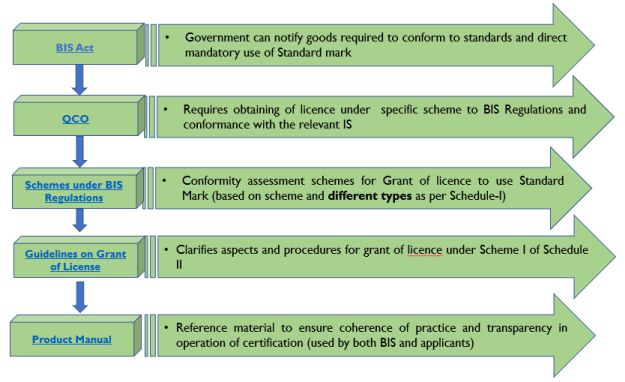- within Insolvency/Bankruptcy/Re-Structuring topic(s)
Introduction
In Part I of ELP's three-part series relating to product quality standard regulations applicable in India (BIS Standards), the overall regulatory environment in India and India's commitment at WTO was discussed at a macro level. In Part II, we delve into the legal provisions relating to BIS Standards, issuance of Quality Control Orders (QCOs) which make compliance with BIS Standards mandatory, and the issuance of BIS licenses. This issue deep dives into legal provisions and certain ambiguities and complexities in India's legal framework on the BIS front. The article also then goes onto discussing potential ways in which companies can navigate these complications.
Historical Background
- The Indian Standards Institution (ISI) was set up pursuant to a resolution of the Government of India dated September 3, 1946. Thereafter, the Indian Standards Institution (Certification Marks) Act, 1952 was enacted. This enactment, however, did not contain any provision requiring compulsory use of the standard mark with regards to any particular article, nor did it confer any power upon the ISI to notify any article or process, so as to require compulsory licence or compulsory user of the Standard Mark.
- In the year 1986, the Parliament promulgated the Bureau of Indian Standards Act, 1986, which established Bureau of Indian Standards (Bureau/BIS) as a statutory corporation and conferred power on the BIS1 to specify the standard marks and to grant licence for the use of the standard mark. BIS is the national body for issuing and regulating quality control standards in India working under the aegis of Ministry of Consumer Affairs, Food & Public Distribution, Government of India for:
-
- providing safe reliable quality goods;
- minimizing health hazards to consumers;
- promoting exports and imports substitute;
- Controlling proliferation of varieties etc. through standardization, certification and testing
- The erstwhile Act of 1986 now stands replaced by the Bureau of Indian Standards Act, 2016 (BIS Act). Indian Standards are issued by the BIS in terms of the BIS Act and the rules/ regulations made thereunder to regulate the quality of product in India.
Present Legal Framework Governing Standards, QCOs and Issuance of License
At present, there are over 21,000 standards which have been formulated by BIS, majority of which are voluntary in nature whereas, some are made mandatory through the issuance of a Quality Control Order (QCO). A bird's eye view of the overall legal framework governing Indian Standards, QCOs and issuance of licenses to use BIS mark on the goods is diagrammatically represented below - each of which are further elaborated in the subsequent paragraphs:

Formulation of Indian Standards – The Consultative Mechanism
- As the National Standards Body, the BIS is responsible for harmonious development of the quality standards for goods, articles, processes, systems and services including for matters connected therewith or incidental thereto. BIS develops Indian Standards through a consultative mechanism in technical committees, comprising of various stakeholders that have interest in the relevant subject – this is to ensure that views of all are given due consideration and a consensus is evolved while formulating a standard.
- The stakeholders can broadly be categorized as industry, consumers/ users, technologists (R&D and scientific institutions, academia, etc.) and government departments/ regulators.
- There are around 1000 technical committees in BIS carrying out standardization work in 15 broad technology areas/sectors2.
- Separate Division Council/ Sectional Committees oversee and supervise the work relating to formulation of Indian Standard.
- Further, all Central Government Ministries and State Governments, as well as Industry Associations across all sectors have been requested for creation of Standardization Cells with the objective to enhance stakeholder involvement. About 64 Standardization Cells have been created in Ministries, Industry Associations, PSUs3. Apart from consultation within the technical/sectional committees, draft standards are also open for public views/ comments.
- The Standards are regularly reviewed and formulated in line with technological developments to maintain harmony with International Standards. The review of Indian Standards occurs as and when considered necessary. It is however necessarily done at least once in five years to establish whether these standards are still relevant, accurate and up-to-date with state of-the-art technology. It is done for authorities to take appropriate action for their reaffirmation, revision, issuing amendments, declare obsolescence or withdrawal.
- There is at present, an exercise initiated to review and update all Indian standards dated prior to the year 2000, which is targeted to be completed over a period of two-three years. The review process requires thorough analysis of technical developments that have taken place in the product/ processes/practices/use or application/testing/ input materials, feedback from manufacturers and users, international and other globally available standards, etc. relevant to the standard under review4.
| Pointers for companies |
| The relevant industry players should keep themselves informed as regards such consultations and submit their suggestions to the draft Standards. In case of any identified gaps between what the Standard prescribes and the practical feasibility of the testing requirements/ technological challenges, necessary representations may be made to the relevant BIS Sectional Committee to consider revision of the Standards. It is advisable for the companies that have a dominant place in the market to pitch for becoming part of such committees to make sure that their key inputs are taken into consideration while developing the standards. |
Issuance of BIS license – Key legal provisions of the BIS Act
- In terms of Section 13 of the BIS Act, BIS has the power to grant: (i) a license to use or apply a Standard Mark, where any goods conform to an Indian standard or (ii) a certificate of conformance wherein demonstration of conformity is desired without the use of a Standard Mark.
- In terms of Section 16 of the BIS Act, the Central Government may direct compulsory use of standard mark on notified products by way of issuing QCOs. In respect of such notified products, in terms of Section 17 of the BIS Act, no person is permitted to manufacture, import, distribute, sell, hire, lease, store or exhibit for sale such goods without a Standard Mark.
- It is especially crucial to note Section 17 of the BIS Act. This provision has a wide impact and casts an obligation on various entities in the transaction chain i.e. a person who "manufacturers" or "imports" or "distributes" or "sells" or "stores or exhibit for the purpose of sale". This intent to make everyone in the chain, and not just the initial manufacturer or the last seller, responsible. This fact is also corroborated by the definition of the term "person"5 as well as the requirements of Section 18 of the BIS Act.
Quality Control Orders (QCOs)
- As stated earlier, majority of Indian Standards are voluntary in nature. However, some Standards are made mandatory by the issuance of QCOs. The decision to make a particular Indian Standard mandatory is essentially taken by the parent ministry dealing with the product covered under the Indian Standard (who then issues the relevant QCO making the Indian Standard mandatory). For instance, the QCO on steel products was issued by Ministry of Steel, on toys by Ministry of Commerce and Industry and on different chemicals by Ministry of Chemicals and Fertilizers.
- QCO is a gazette order issued under Section 16 of the BIS Act. The issuance of a QCO is an announcement by the Government of its intention to make the applicability of relevant standards prescribed by BIS, for the import /production/ storage/ distribution/ sale, etc. of the relevant products mandatory effective from a date mentioned therein. It stipulates the manner of quality control monitoring and procedure to be carried out to obtain licences(i.e. the relevant scheme of conformity to be followed– discussed in detail later). It also typically prescribes BIS as the authority responsible for enforcing the QCO, including the penal consequences for any contravention of the QCO.
Coverage of products under the QCO
- The QCO specifies the scope and variants of the products which are specifically covered. Several questions/ambiguities arise here with respect to coverage under the QCO- whether a particular variant of a product is covered, whether parts/ components of the product are covered and even whether only pure products or even a combination/mixture of the product is also being covered.
| Pointers for companies |
| The coverage of certain products/raw-materials/parts etc. within the scope of the QCO need to be specifically addressed by an applicant after examining the exact language of the QCO itself as well as the underlying Indian Standard which is made mandatory by the QCO. |
Click here to continue reading . . .
Footnotes
1. Section 10 of BIS Act, 1986
2. Source: BIS Annual Report 2020-21, available at: https://www.bis.gov.in/wp- content/uploads/2022/02/Annual_report_for_final_approval_on_12-1-2022.pdf
3. Ibid
4. Ibid
5. Defined as follows: "a manufacturer, an importer, a distributor, retailer, seller or lessor of goods or article or provider of service or any other person who uses or applies his name or trade mark or any other distinctive mark on to goods or article or while providing a service, for any consideration or gives goods or article or provides service as prize or gift for commercial purposes including their representative and any person who is engaged in such activities, where the manufacturer, importer, distributor, retailer, seller, lessor or provider of service cannot be identified"
The content of this article is intended to provide a general guide to the subject matter. Specialist advice should be sought about your specific circumstances.





